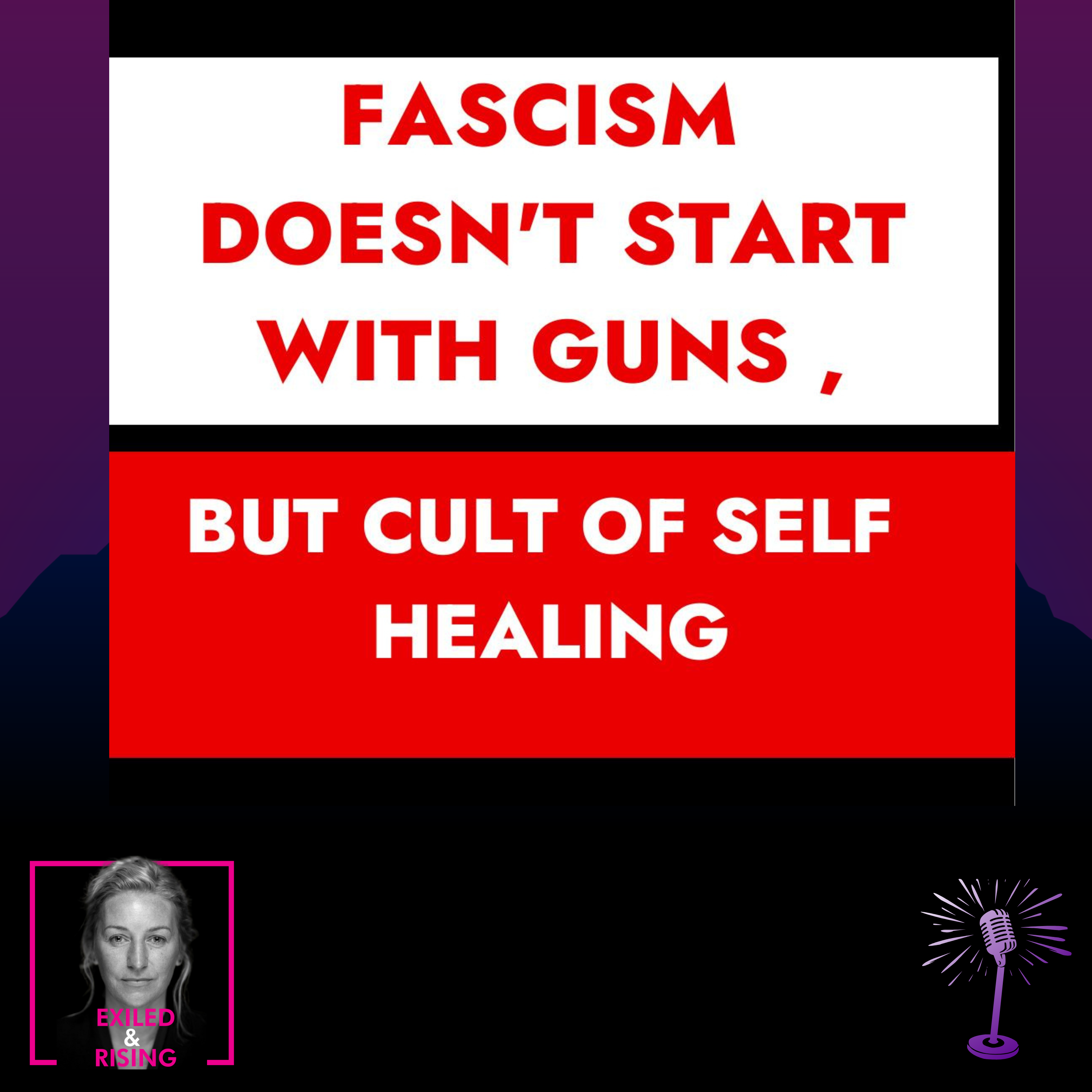Episode Transcript
[00:00:01] Welcome.
[00:00:02] I am Anna Mail, your host of excellent Rising.
[00:00:08] Today I want to talk to you who live with ptsd to you who live with chronic hyper vigilant state.
[00:00:22] I'll read a poem I wrote about this hyper vigilant part in us.
[00:00:29] It's called Captain. Captain.
[00:00:32] And if you ever did internal family system work, if you know ifs I'm referring, um, from a witnessing part, okay, Adult self to hyper vigilant part, which is born as a cause of complex trauma.
[00:00:55] So that part I'm calling Captain, the captain part is born from complex trauma, right?
[00:01:03] And that part doesn't just appear out of nowhere.
[00:01:10] That part in us, uh, hyper vigilant part, is transformed from the most vital, uh, alive, curious part of the body, very innocent part a team player, a, uh, captain.
[00:01:36] And that part in us, uh, we all have, that had to be transformed into the protector, into someone who is continuously alert.
[00:01:51] The part who never rest, the commander, the doer.
[00:01:57] A part who cannot dissociate soul. People with hyper vigilant state, with complex ptsd. You know that part, right?
[00:02:14] And what's very important here by nature.
[00:02:20] So if you look without trauma or before trauma happened, that part is your will.
[00:02:31] That's your innate power.
[00:02:34] That's your tenacity.
[00:02:36] That's when you're your best. That's when you're playing your game. And you're just in zone. You're just.
[00:02:42] There is a, uh, flow, confidence.
[00:02:47] Your body just leads without overthinking. Okay?
[00:02:54] That's your inner warrior.
[00:02:57] The one who wants to play, to live, to be with others.
[00:03:02] It's an innate aliveness, vitality.
[00:03:07] And then trauma.
[00:03:09] This part becomes the one who guards the door, who is protecting all your inner parts, your inner child, your tired part. Part who wants to dissociate.
[00:03:24] Part who doesn't want to live anymore. The part who is so young and unprotected.
[00:03:34] And Captain is a, uh, part who never lets you sleep, who never lets you relax, who cannot stand you or others to move slowly or talk slowly.
[00:03:56] It goes nuts if it needs to wait.
[00:04:02] For others or for self.
[00:04:05] It has zero patience.
[00:04:09] It's always on.
[00:04:16] Has zero tolerance for anyone or self to take time.
[00:04:28] There is no time to think, to reflect or contemplate or see yourself fully in front of the mirror and witness.
[00:04:42] That's a luxury for that part, that part inside of you.
[00:04:50] The moment you start to noticing yourself on the mirror, you just want to take a look. Who is that person?
[00:04:57] That part pulls you out.
[00:05:00] And it's already on the next five things you have to do.
[00:05:06] And with that part, there is only urgency to act and survive.
[00:05:13] So you feel exhausted, burdened.
[00:05:17] If you're judging yourself for always being tense, for the loud, demanding voices in your head yelling at you, commanding.
[00:05:33] Well, uh, this is your captain.
[00:05:38] And there is a moment in therapy when clients recognize what they had to transform because you had to transform that and become that part in order to stay alive.
[00:06:01] And this is a turning moment for many people.
[00:06:04] I, uh, can even say for all people, it's a turning moment in a person and their PTSD healing.
[00:06:15] It's almost a moment where we can see how we were forced to transform that innocent captain of the team into a, um, hyper vigilant, very strict, very demanding, ruthless and restless captain. A general.
[00:06:42] Innocent captain of the team had to be transformed.
[00:06:49] So this is for you. For all of you.
[00:06:56] For all of your hyper vigilant captain inside of you.
[00:07:02] And just witness and notice.
[00:07:07] This is a poem for that part of you that keeps you always alert.
[00:07:17] Oh, Captain. Captain.
[00:07:20] O Captain. Captain.
[00:07:23] Don't be so stunned.
[00:07:26] You had to leave your innocence so the team could survive.
[00:07:34] It was never you who disappeared, but the trust in humans you had to let go.
[00:07:44] You gathered your troops, put up the shield, and became a vigilant master, Never allowing yourself or me to pause or rest.
[00:08:02] You were afraid I would resign and drown you down into the death we witnessed.
[00:08:10] All the time, you pulled me up, commanded me to move.
[00:08:17] All those years you kept me alive when all my body wanted was to shut down.
[00:08:29] You shouted in my ears to get up when my legs wanted to collapse.
[00:08:38] Terrified by strangers.
[00:08:41] You moved into my muscles, into my feet, pushing me through the doors I never wanted to step into.
[00:08:51] You pulled my shoulders up, lifted my head when I was seen as less.
[00:09:01] And when all in me, covered in shame, wanted to hide and look only at, uh, the ground.
[00:09:16] When I received hatred, when I received injustice, you, captain, never returned with hatred.
[00:09:28] You always knew what was right and just and helped others, Even when the two of us were left to die so many times.
[00:09:47] Your acceptance of injustice and all the crimes wasn't defeat, but the reality of war and horrors you witnessed ahead of me.
[00:10:03] When you became silenced and I was losing my mind, I thought I wasn't even worthy of your help.
[00:10:14] But you gather your strength so we could survive. You kept me alive, and I thought you had given up.
[00:10:25] You pulled me up when I wanted to resign and die.
[00:10:34] My captain. Captain, I see you now, Exhausted and burdened, Pulling me through the trenches of, uh, war and displacement.
[00:10:49] You commanded you Shouted. You pushed. You screamed into my head.
[00:10:55] Not because you saw me as unworthy as the world did, but because you never wanted to give up on humanness and the worthiness inside of us.
[00:11:13] I see the toll you paid.
[00:11:16] Keeping me up, giving me spark, when all in me wanted to die.
[00:11:26] You lost your innocence. You had to transform from the game to defense, from peace to war, from trust to vigilance, from child to captain.
[00:11:39] Your drive and sense for justice kept me alive.
[00:11:45] Your acceptance of injustice was never okay, but. But it was the wisdom of an old soul knowing how to keep me quiet and small.
[00:12:01] You made us hide so we could survive.
[00:12:08] And you did your best not to let me give up.
[00:12:19] We did the best we could.
[00:12:22] Just two kids.
[00:12:25] We were so young, and we survived.
[00:12:32] Now, can we slow down?
[00:12:37] My dear Captain, you can take a rest.
[00:12:44] You can regain trust.
[00:12:47] And if you see me pause, I didn't resign.
[00:12:53] I am adult now, taking a rest and watching you play the fear game.
[00:13:04] I am alive, and I'm not giving up.
[00:13:12] And I thank you for saving my life.
[00:13:29] So let's pause. Just pause and absorb those words.
[00:13:46] Can you feel that part of you, the one who never slept? Can you feel your captain?
[00:13:57] That vigilant voice in your head is not cruel.
[00:14:01] It's not broken.
[00:14:05] It is sacred.
[00:14:08] It carried the whole of you when everything inside was falling apart.
[00:14:19] And it wanted you and still wants you alive because it knows you deserve a life.
[00:14:37] And now, uh, maybe, just.
[00:14:40] Just maybe in this moment, Captain can sit beside you.
[00:14:51] Not ahead of you, beside you.
[00:15:00] It can pause.
[00:15:04] Can pause.
[00:15:24] So in your next days, maybe after this episode, pause together and bow, um, to your captain.
[00:15:40] Bow to that voice.
[00:15:45] And let your captain know that you honor.
[00:15:55] That you truly honor them.
[00:16:02] And that it can rest.
[00:16:07] For many of us, war is over.
[00:16:10] For many of us, trauma is over.
[00:16:17] Even it's still alive in our head.
[00:16:23] And if you're living in active state of trauma because you're in displacement in war, let that captain be alive.
[00:16:38] Your captain knows what to do.
[00:16:40] It knows how to keep you safe.
[00:16:44] It knows how to keep you small so you survive.
[00:16:49] It knows how to keep you away from others because it's safe.
[00:16:59] And your captain will not allow you to resign.
[00:17:07] It has enormous wisdom.
[00:17:10] Your body, your biology, your nervous system, your soul has enormous wisdom.
[00:17:22] Don't push it. Don't fight it.
[00:17:25] Don't condemn. Um, don't minimize. Don't on. Devalue.
[00:17:30] Honor it.
[00:17:32] Honor.
[00:17:39] As I honor you on your journey.
[00:17:54] I am Anna Mayo.
[00:17:57] This is Excellent Rising.
[00:17:59] Subscribe, Follow, support check the links in the show notes, and, as always, much care.
[00:18:17] Much care.



